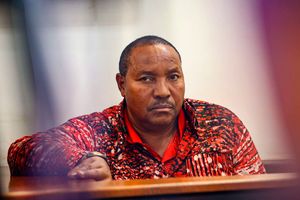Premium
Democracy: Is it time for African leaders to look beyond America

US President Joe Biden with African Heads of State during the US-Africa Leaders Summit in Washington, DC, on December 15, 2022.
What you need to know:
- America’s ability to preach democracy to African nations has been questioned by the reality of its own history.
- At the recent America-Africa summit, Washington is said to have positioned itself as the best alternative partner for Africa.
America’s democratic ideals and policies in Africa are attracting increased scrutiny amid suggestions the continent should consider inward solutions.
This comes weeks before another African democracy summit organized by America in Africa, a meet that could fashion into a report card of what is right and wrong in the democratic space on the continent.
Herman Manyora, a leading political analyst in East Africa, argues that the summit should offer a platform for discussions rather than the question and answer sessions it has been known for.
“Let America talk to the world as equals. It should not be a situation where you preach water and drink wine, taking into account some of America’s past history,” says Prof Manyora
Mr Manyora further argues that America is losing leadership in democracy because of a number of factors such as doublespeak and policing of democracy among African countries.
The threat to America, according to the analyst, is that Africans are at that point where they could source for alternative partners amid the growing influence of China and Russia on the continent.
Pinnacle of democracy
America did concede at the recent US Africa summit in Washington in December of 2022 that Africa will shape the future of the African people and the world.
Speaking at the summit, President William Ruto of Kenya asked the US to rework its relationship with Africa, especially on matters of trade and investment.
"We need to engineer a win-win formula in our relationship and dealings," President Ruto said.
The United States has long portrayed itself as the pinnacle of democracy and a protector of freedom and frequently uses this to call out African nations for not upholding democratic ideals.
The latest example of United State's strong influence in Africa is the open threat to cut funding towards health projects in Uganda if the East African country approves anti-gay laws.
The US has also been keen to 'advise' Kenyans on the effects of a recent court ruling on Lesbian, Gay, Bisexual, Transgender, Intersex, Queer (LGBTQ) community.
Racism and discrimination
However, America’s ability to preach democracy to African nations has been questioned by the reality of its own history and the current political climate.
Specifically, America’s record on racism and discrimination is well documented, and offers the best example, perhaps of the challenges it faces in the democratic space.
America was a slave holding country for centuries, where African Americans were brutally abused, denied human rights, bought and sold as property.
African Americans are meanwhile still subjected to discrimination in the country despite their civil rights having been recognized in 1960.
Also, it is challenging for America to assert moral superiority on democracy when for instance, supporters of former President Donald Trump stormed the US Capitol in 2021 because they did not want to accept the results of a democratic election.
Alternative partner
At the recent America-Africa summit, Washington is said to have positioned itself as the best alternative partner for Africa.
This despite its history of supporting authoritarian regimes and controversially supporting the exit of democratically elected regimes in a bid to control its interests.
The best example is the move to back a military coup in Chile that toppled a democratically elected government of Salvador Allende in favour of Augusto Pinochet.
There is also the contribution of the US in the change of regimes in Iraq, Afghanistan and Libya.
For now, America should focus on improving itself and serving as a better example to the rest of the world rather than lecturing others.
Only then will it have the moral authority to start advancing democracy and human rights abroad.





